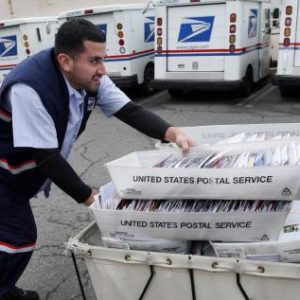Americans may not agree on much these days, but we do stand united in one thing: distrusting the federal government.
In fact, a mere 20 percent of the American public trusts the federal government, with a sizable majority understandably frustrated at how Washington, D.C., serves (or fails to serve) the 50 states.
One critical issue undermining trust in the federal government is the disturbing lack of transparency from federal agencies which consistently spend far beyond their means and fail to deliver for the American people.
The United States Postal Service (USPS) in particular routinely hides information from taxpayers and consumers and denies Freedom of Information Act (FOIA) requests at an alarming rate. Unless agencies such as the USPS open their books and pursue transparency, Americans will continue to second-guess their bloated and unaccountable government.
It’s no secret that the USPS loves keeping secrets. The agency is notoriously tight-lipped about its dealings with private companies and how it prices its products. America’s mail carrier even refuses to disclose its (hopefully inflammable) tire purchasing strategies.
Unfortunately, this secrecy pervades more serious issue areas such as the USPS’ effort to prevent opioids from coming into the U.S. Current law requires the agency to provide Advance Electronic Data (AED) to all packages coming in from overseas.
According to a recent report by the USPS Inspector General (IG), the agency will be unable to meet Congress’ requirement to monitor all incoming packages by January 1, 2021. Yet readers of the IG report will find that critical information is blotted out by a thick sludge of black ink.
Apparently, the USPS doesn’t want Americans to know the percentage of all incoming packages in the first half of FY 2020 that had AED. In addition, readers are told on page seven of the report that, “China dominates inbound volume.”
Yet the percentage of packages entering the U.S. from China Post is… you guessed it, redacted. Readers of the IG report are also kept in the dark about which countries are complying with USPS electronic data requests, and which are falling behind.
It’s unclear why the beleaguered agency is so insistent on keeping secrets from the American people. And, unfortunately, the issue extends far beyond electronic data for inbound packages.
In FY 2019, the agency issued full FOIA denials to more than 35 percent of processed and finalized requests. This makes the USPS moderately more transparent than the CIA (~55 percent); but far more secretive than the National Aeronautics and Space Administration (~11 percent); the Department of Justice (6 percent); and the Department of Homeland Security (~2 percent).
That’s right, America’s mail carrier is far more secretive than agencies tasked with defending the homeland, bringing criminals to justice and operating sensitive satellites.
In addition, some heavily redacted reports hint that USPS leadership isn’t happy with the IG pointing out flaws in the postage reselling program, which results in commercial consumers who would’ve used USPS anyway benefiting from special discounts.
Released thanks to a FOIA request by the Capitol Forum, a (still heavily redacted) IG report claims that management’s hostility toward investigating the reselling program amounts to an “attack on the independence of the OIG and an attempt to keep important work from being disclosed to critical stakeholders.”
While a slew of black ink prevents folks from seeing exactly what the IG found about the reselling program, USPS leadership’s push for secrecy speaks for itself. The program is estimated to cost taxpayers more than $200 million per year, which doesn’t bode well for an agency with more than $160 billion in unfunded liabilities.
These flagrant abuses of trust don’t bode well for the agency, or the federal government at large. The USPS can reverse this sorry slide toward secrecy by releasing information on its package monitoring processes and ailing finances.
Unless agencies such as the USPS open up to the American people, 80 percent of the public will continue to mistrust Washington, D.C. The reality is that bureaucrats can, and must, do better.

